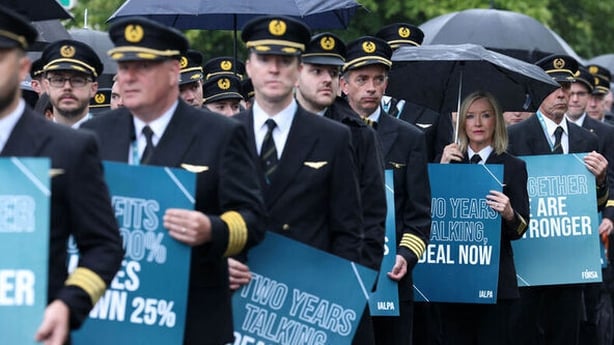The year began with the agreement of a new public sector pay deal securing industrial peace for the Government.
The same could not be said for the aviation industry however with industrial action by Aer Lingus pilots causing widespread disruption in the early summer months.
The year also saw questions being raised about the future of remote working with some big companies telling staff to return to the office.
Public sector pay deal
Talks between unions and Government representatives before Christmas 2023 had failed to agree a new public sector pay agreement.
Negotiations resumed in the New Year and by late January a deal was done.
The new agreement provided for pay increases of 10.25% and over a two-and-a-half year period benefitting 385,000 public servants including nurses, doctors, gardaí and teachers.
The Government had offered a pay increase of around 8.5% over two-and-a-half years but unions had sought increases worth around 12.5%.
Keeping with the tradition of late-night talks, the negotiations concluded in the early hours of the morning after going on throughout the night.
The deal included a local bargaining mechanism to provide an avenue by which employers and grades, groups and categories of public servants can address issues involving changes in structures, work practices or other conditions of service.
The agreement runs until 30 June 2026 meaning it will fall on the new incoming Government to negotiate a successor agreement.
Aer Lingus pilots
The travel plans of thousands of holiday makers were thrown into disarray in the summer.

On 26 June Aer Lingus pilots, who are members of the Irish Air Line Pilots' Association (IALPA), began a two-week work-to-rule in a dispute over pay.
IALPA members also engaged in an eight-hour strike on 29 June.
The industrial action led to the cancellation of 610 flights at the peak summer season impacting around 84,000 passengers.
For months before the action, the gap between the two sides seemed impossible to bridge.
Pilots voted overwhelmingly to reject an interim Labour Court recommendation of a 9.25% pay increase, well below the 23.8% that IALPA had been seeking.
A subsequent Labour Court recommendation of a 17.75% pay increase for pilots was ultimately accepted by IALPA members.
It meant that the dispute was over but it came at a high price.
Aer Lingus said that the disruption would lead to €55m in direct costs for expenditure such as the leasing of aircraft, reaccommodating customers and paying out compensation.
Remote working
While Aer Lingus passengers were worried about their travel plans this summer, many remote workers started to worry about being called back into the office.
Big companies such as Amazon, Dell and IBM told staff that their days of working from home were coming to an end.
Research from business group Ibec showed that while few employers were demanding workers come back into the office five days a week, there has been an increase in companies requiring staff to be on-site for some of the week.

"We are seeing a lot of employers changing how their remote and hybrid working policies are put into effect," said Maeve McElwee, Executive Director of Employer Relations at Ibec.
"About 26% of employers said to us this year that they are looking at introducing more mandatory attendance on certain days," Ms McElwee said.
In October, hiring platform IrishJobs said that the number of fully remote vacancies had fallen to its lowest level in four years.
However, the company is predicting that hybrid working is here to stay.
"Despite some high-profile return-to-the-office mandates by large multinationals this year, IrishJobs data shows that the proportion of hybrid working vacancies has remained relatively stable, fluctuating between 11.2% and 12.4% over the past six quarters," said Sam Dooley, Country Director of The Stepstone Group for Ireland and responsible for IrishJobs.
"This stabilisation indicates that hybrid working is set to remain a key feature of the labour market in Ireland next year," Mr Dooley said.
Health staffing
As soon as the next government is formed, it could be hit with a major industrial dispute impacting the country's health service.
Members of health unions have voted in favour of talking industrial action ballots in a dispute over staff shortages.
Initially the action would likely take the form of a work-to-rule but this could be upgraded to strike action.
The group of trade unions, which includes the Irish Nurses and Midwives Organisation (INMO) and Fórsa, has said that recruitment restrictions in the health sector are putting services under enormous strain and are putting patient safety at risk.

The HSE has described the action as "regrettable" against the background of additional funding for the health service and increasing staff numbers.
It said that its Pay and Numbers Strategy has enabled it to stabilise its workforce numbers and has allowed it to increase staffing levels.
Section 39 workers
In October 2023, a pay agreement was reached with staff in the community and voluntary sector, hours before strike action was due to commence involving 5,000 workers across 17 organisations.
The agreement included an offer from the Government of an 8% increase in funding for wages which was to benefit workers in Section 39, 56 and 10 organisations.
These are privately run bodies that are contracted to provide services the State is areas such as health, children's services and homeless supports.
The deal was designed to close the pay gap between workers in the community and voluntary sector, and those who are paid directly by the State in agencies such as the HSE.
Charities have warned however that, although the pay deal was agreed more than a year ago, many workers have yet to receive their increases and pay parity with State employees has not yet been achieved.
They say this means a recruitment and retention crisis is ongoing which is impacting the vital services that are provided to some of the country's most vulnerable citizens.
The issue of pay for Section 39 workers came to the fore during the election campaign following an encounter between the Taoiseach Simon Harris and disability worker Charlotte Fallon in Kanturk, Co Cork.
Despite commitments to address the problem, just days after that encounter unions expressed their frustration over a lack of progress on the issue.
EU Directive
In November, the Government said it expected to meet a deadline to transpose a major EU directive on workers' rights.

Unions however accused the State of not fully implementing the rules by failing to pass new legislation.
The EU Directive on Adequate Minimum Wages seeks to reduce working poverty and inequality by improving statutory minimum wages, as well as promoting collective bargaining.
Collective bargaining is the process of negotiation between employers and employee representatives such as trade unions.
Under the directive, member states with less than 80% collective bargaining coverage, which includes Ireland, must establish an action plan to promote collective bargaining.
The Department of Enterprise said it had received legal advice that Ireland's current minimum wage setting framework is largely already in compliance with the provisions of the directive, and that no new legislation is required on the collective bargaining side.
The Irish Congress of Trade Unions (ICTU) said it was "disgraceful and unacceptable" that the Government had failed to fully transpose the directive.
The country's largest trade union SIPTU has warned that there could be industrial unrest and protest over the Government's failure to legislate for the EU rules.
A year that began with a public sector pay deal that secured industrial peace is ending with signs of unrest.
Whether it is staff shortages in health, pay parity for Section 39 workers or union anger of a failure to legislate for collective bargaining, the new government could have some new challenges to deal with in its earliest days.







